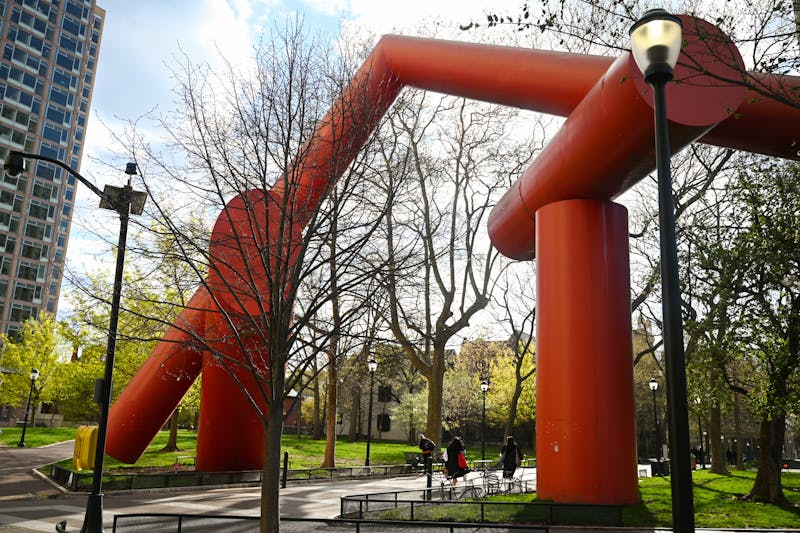Think of any 10 undergrads at Penn. Would you believe that four or five of them might be depressed?
According to a national survey of 13,500 college students published in the New England Journal of Medicine in 2005, 45 percent of undergraduates reported experiencing depression severe enough to prevent them from functioning day to day.
According to Counseling and Psychiatric Services, more than 10 percent of Penn students meet with a counselor at CAPS each year. You do the math: Either Penn students are less prone to depression than the average college student, or many cases go unreported every year.
Wharton and SEAS administrators think the latter, and are hoping to promote students' mental well-being through the optional PennSTART (Successful Transition and Resilience Training) program.
This initiative has the potential to improve student attitudes toward college life while keeping a check on the culture of overachievement prevalent among undergrads.
However, the student body should not pass the buck of mental health onto Penn. Student culture is a product of student attitudes, so the freshman class should use PennSTART as a springboard for change, not reaffirmation of unrealistic personal standards.
PennSTART intends to use positive-psychology techniques to promote the emotional strength and overall mental wellness of Wharton and SEAS freshmen.
Martin Seligman, a Penn professor and leader in the field of positive psychology, found promising results from a pilot study conducted with Penn undergraduates.
PennSTART has four phases. First, incoming Wharton and Engineering undergraduates complete four basic emotional well-being surveys the summer before they arrive at Penn.
For the second phase, set to begin on Oct. 10th, freshmen complete ResilienceOnline Training.
At the beginning of their sophomore year, a six-week program of positive-psychology exercises will be provided to the same students. At the end of sophomore year, the four well-being surveys will be repeated and compared to initial results.
Sonya Gwak, a member of the PennSTART Initiative Steering Committee, said, "I think the most valuable aspect of the PennSTART Program is that freshmen will learn how to identify, articulate and solve common problems they may face transitioning to college."
For the sake of future incoming classes, I hope the program proves successful because college students are expected to learn more, work more and play more than ever before.
To make matters worse, every year at convocation President Gutmann tells freshmen that they're "The Best Incoming Class Ever."
With that kind of pressure, it's unsurprising that grades are inflating, resume items are proliferating and depression is rearing its ugly head in the process.
PennSTART recognizes this trend in college student culture and is attempting to address it in a proactive manner.
Perhaps the steering committee should also look into another trend: narcissism. Researchers at San Diego State University examined the results of a survey of 16,475 college students nationwide who completed the Narcissistic Personality Inventory evaluation between 1982 and 2006.
In 2006, two-thirds of the students had scores indicating above-average levels of narcissism, 30 percent more than the first survey in 1982.
Jean Twenge, head of the study, said narcissists tend to lack empathy, react negatively to criticism and favor self-promotion over helping others.
Promoting positive psychology to narcissists might create super Whartonites: They'll do whatever it takes to get ahead, but when they fail, they'll still feel good about themselves. God help us all.
Jokes aside, narcissism may be a great barrier to PennSTART's success. If students believe that they're too levelheaded and intelligent to experience anxiety or depression, they'll cast aside PennSTART before giving it a look.
I can admit to being one of these students. I could've benefited from PennSTART, but I probably would have cast it aside as a crutch for the weak-willed.
This is why I have a message for Wharton and Engineering freshmen: Get over yourselves - you're not the best, nor do you have to be. It's great that you're raising the bar of collegiate success, but you're not invincible. Give PennSTART a chance.
I also have a message for the administration: If the program proves initially successful, make it mandatory for incoming students a la AlcoholEDU. Distant rewards and raffle prizes will not motivate busy students to take the program, but an ounce of PennSTART is worth a pound of CAPS.
Ernest Gomez is an Engineering and Wharton senior from Beverly Hills, Calif. His e-mail address is gomez@dailypennsylvanian.com. Please, Call Me Ted appears on Mondays.
The Daily Pennsylvanian is an independent, student-run newspaper. Please consider making a donation to support the coverage that shapes the University. Your generosity ensures a future of strong journalism at Penn.
DonatePlease note All comments are eligible for publication in The Daily Pennsylvanian.








